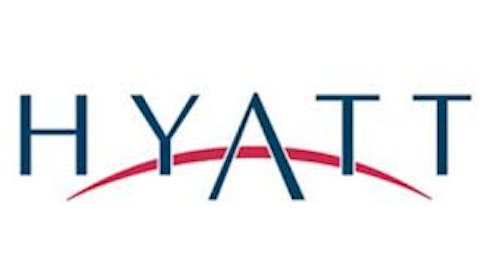The travel business has always been very dependent on the health of the economy, particularly the unemployment rate and consumer confidence level. With the economic recovery beginning to actually look sustainable, maybe now is a good time to get back into this sector. One of my favorite plays on the increase in travel over the next few years is Marriott International Inc (NYSE:MAR), one of the world’s largest hotel companies.
Marriott: Past, Present, and Future
Marriott International Inc (NYSE:MAR) owns or franchises over 3,800 hotel properties with a total of more than 660,000 rooms. It operates under the Marriott International Inc (NYSE:MAR) brand name, as well as Ritz-Carlton, Renaissance Hotels, Courtyard by Marriott International Inc (NYSE:MAR), Fairfield Inn, SpringHill Suites, Residence Inn, and TownPlace Suites.
After the real estate bubble burst, times got especially tough for Marriott International Inc (NYSE:MAR)’s timeshare business, and tried to change its strategy by lowering timeshare prices and stopping future development, which wound up resulting in losses of about $750 million during the third quarter of 2009. Eventually, the company decided that it had enough of the timeshare business and spun it off as Marriott Vacations Worldwide Corp (NYSE:VAC) in order to focus strictly on the more lucrative hotel business.
Ironically, since the spin-off, the timeshare business has done very well. Marriott Vacations Worldwide Corp (NYSE:VAC)’s revenue was about $1.5 billion last year, and is projected to rise to $1.7 billion this year on strength in both real estate and discretionary spending.
As the chart below indicates, after a significant drop in revenues once the financial crisis hit, Marriott International Inc (NYSE:MAR)’s business has certainly rebounded and then some, with 2012 being the company’s best year (revenue-wise) in its history, adjusting for the spun-off timeshare business.

**Note: 2012 results and 2013-2014 consensus projections are adjusted to account for the effect of the timeshare business’ spin-off.
The company’s strategy lately has been to reduce their hotel ownership in favor of a more predictable and lucrative business model of franchising and management. As the economy continues to improve, more people will travel, both for business and leisure, and the number of properties that Marriott franchises should steadily rise over the next several years.
The Numbers
Marriott’s 2012 revenues of $11.8 billion are expected to rise to $12.7 billion this year and $13.6 billion next year, for revenue growth of 7.8% and 7.1% respectively. This is expected to produce annual earnings growth of 18.6% and 17.2%, a result of a combination of higher revenues and higher operating margins. Shares trade for about 22.5 times TTM earnings, which seems very reasonable given the forward growth rate.
Another Candidate: Starwood Hotels & Resorts Worldwide, Inc (NYSE:HOT)
Starwood Hotels & Resorts Worldwide, Inc (NYSE:HOT) is another hotel company worthy of consideration, and is very similar in size to Marriott, with more of a luxury orientation. Starwood Hotels & Resorts Worldwide, Inc (NYSE:HOT) operates such brands as Sheraton, Westin, W, St. Regis, Luxury Collection, and Four Points. Starwood Hotels & Resorts Worldwide, Inc (NYSE:HOT)’s revenues have grown even faster than Marriott’s lately, as luxury spending was down tremendously in the crisis years and has come back with a vengeance lately.
Starwood Hotels & Resorts Worldwide, Inc (NYSE:HOT) trades for a similar valuation of 21 times earnings, which are projected to grow at a more modest rate than Marriott at around 10% annually over the next three years. Worthy of consideration, however, is that Starwood Hotels & Resorts Worldwide, Inc (NYSE:HOT) has about half of the debt load of Marriott, and the added financial flexibility that goes with it.
Alternative to Hotels: Priceline.com Inc (NASDAQ:PCLN)
For those who want exposure to the travel business, but don’t necessarily want to invest in a hotel company, check out Priceline.com Inc (NASDAQ:PCLN) as an alternative way to play the space. Most Americans know that Priceline.com Inc (NASDAQ:PCLN) is the leader in online travel services, but what they generally don’t realize is that most of Priceline’s operating income (over 90%!) comes from its European business. Priceline now seems ready to aggressively pursue the Asian travel market, which could prove to be the company’s most lucrative, eventually.
Don’t let Priceline’s P/E of 28.2 times earnings scare you off. Priceline is projecting earnings of $38.41 per share for the current fiscal year, increasing to $45.96 and $54.80 in 2014 and 2015, respectively. This corresponds to a 3-year forward earnings growth rate of 20.6%, which more than justifies the valuation. Priceline also has about $4.3 billion in net cash (cash minus debt) on its balance sheet, which is a great indicator of a company’s financial health.
Conclusion
Whichever investment you ultimately decide on, it’s hard to go wrong in the travel sector at a time when the economy is improving and expected to continue to do so. Priceline is a bit too risky for my long-term portfolio, but which one is right for you depends on your personal level of risk tolerance.
The article The Travel Business Should Thrive In This Economy originally appeared on Fool.com.
Matthew Frankel has no position in any stocks mentioned. The Motley Fool recommends Priceline.com. The Motley Fool owns shares of Priceline.com. Matthew is a member of The Motley Fool Blog Network — entries represent the personal opinion of the blogger and are not formally edited.
Copyright © 1995 – 2013 The Motley Fool, LLC. All rights reserved. The Motley Fool has a disclosure policy.



